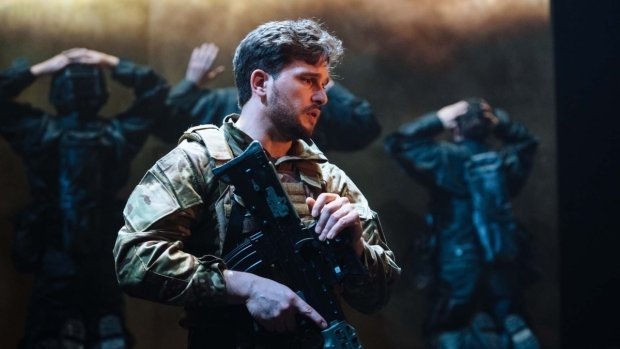Henry V with Kit Harington at the Donmar Warehouse – review

© Helen Murray
When the Donmar Warehouse announced a production of Henry V starring Kit Harington, alias Jon Snow in Game of Thrones, no-one could have predicted that its opening night would have been staged against the backdrop of a real war in Europe.
As it is, Vladimir Putin's brutal invasion of Ukraine provides a chilling echo that runs all through the evening as Hal, the playboy prince (first seen in a scene imported from Henry IV upchucking in a nightclub, singing "Sweet Caroline" with his riotous friends) becomes Henry, the steely wartime leader, leading an incursion into France.
What Max Webster's modern-dress production proves is how many ways Henry V can be interpreted, revealing Shakespeare's uncanny understanding of the brutalising effects of any war. In this gender-balanced production, it makes men and women heroic and violent in almost equal measure. A quotation from the Jewish philosopher Walter Benjamin is projected onto the set: "There is no document of civilisation that is not also a document of barbarism."
That sense of duality, of ambivalence, colours the evening. By the close, Fly Davis's simple setting, of a golden wall and pale steps has become a grey, filthy battleground, scattered with the boots of the French prisoners the English have killed. Harington has changed from a tentative smoothie, uneasy when making decisions, sad-eyed when renouncing his friends, into a battle-hardened leader, with the jabbing hands and practised charm of the politician.
Harington is, of course, the main point of interest and he rises to the challenge of the part. This Henry is a charmer, with a loner's wariness that can melt when he needs to persuade. In the first act in particular, he finds his way beautifully through the long inspiring speeches, taking you inside his head as his voice catches slightly as he unwinds the words. His "Once more into the breach, dear friends" delivered from a gantry, in the midst of swirling smoke and flashing lights, is a rousing cry to war; the St Crispin's Day speech before Agincourt has charismatic power.
There are odd moments when both his and Webster's inexperience with Shakespeare makes the energy of the language fall, but this is an impressive performance – and Webster surrounds it with a production full of energetic detail and insight. An ex-Royal Marine Tom Leigh has been brought in to give a smack of realism to the military action, and this, combined with Benoit Swan Pouffer's movement direction, Kate Waters' fight direction and Lee Curran's lighting, makes the battle scenes unusually visceral, particularly in the Donmar's confined spaces.
Andrzej Goulding's evocative video projections and the ecclesiastical music that punctuates each scene also help to underline the sense of an ordered society upended by war, while the decision to play the French court scenes in French (with surtitles) pays dividends in the way it emphasises two nations who literally do not speak one another's language and have no comprehension of what each is fighting for.
In this context, Anoushka Lucas's French princess Katherine becomes a much more assertive figure, a wise advisor to her father when her silly brother the Dauphin (Olivier Huband) is all preening vanity, who learns English while practising boxing and who – in Henry's final courtship of her – understands that statecraft not love is at work.
But all the small cast, doubling and tripling many parts, are excellent. Millicent Wong's Chorus is both descriptive – transporting us from scene to scene – and unusually full of feeling, breaking into her native Mandarin when the horror of what she is witnessing overwhelms her. Melissa Johns is a touching, direct Mistress Quickly; Danny Kirrane's Pistol is both loathsome and pitiable; Steven Meo's Llewellyn unusually nuanced.
I had some issues with the treatment of the supposedly comic scenes in the second act – making them so dark doesn't necessarily make them more bearable – but it's a quibble amidst a production that has scope, strength and winning confidence.










